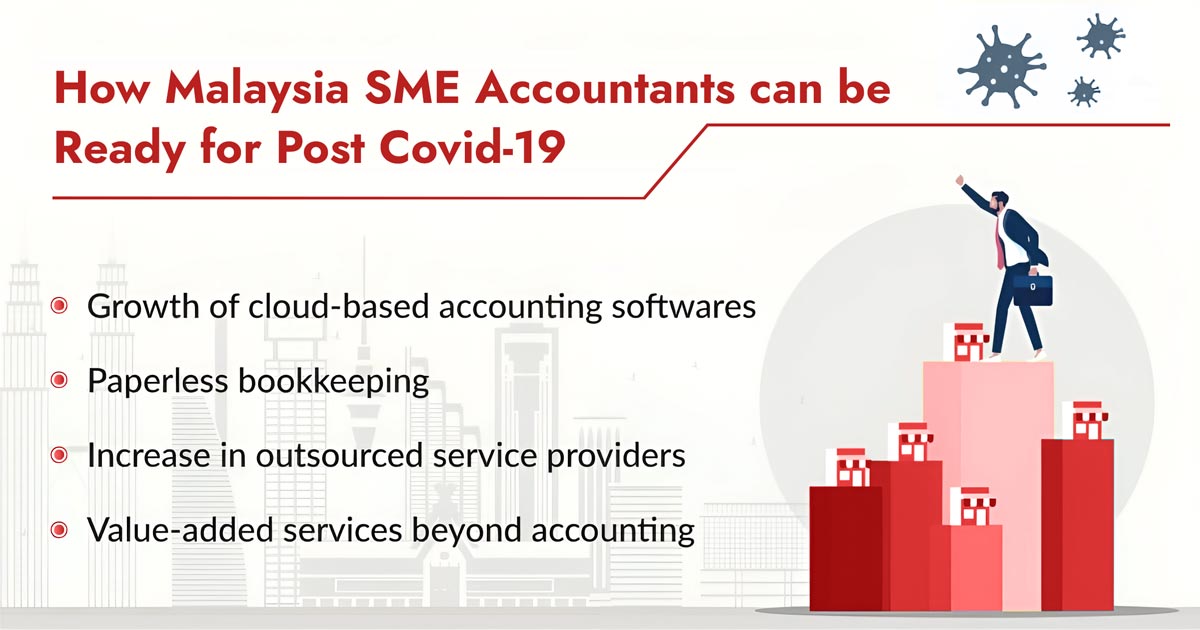Many small and medium-sized enterprises (SMEs) in Malaysia are being forced to implement and adopt Work-From-Home (WFH) policies due to the various lockdowns imposed to combat the spread of Covid-19. Such policies were in place although many SMEs in Malaysia were not prepared for it.
This incident will likely accelerate the digitization process of these SMEs in Malaysia in the coming months, as the following 4 scenarios highlighted below are expected to become the new norms.
Table of Contents
1. Growth of Cloud-Based Accounting Software Use
Traditionally, most SMEs in Malaysia use desktop-based accounting software from traditional software providers. Despite some desktop-based providers having upgraded software with cloud functionalities, their offerings still have certain limitations.
In developed markets such as the US, UK and Australia, their SMEs have been adopting cloud-based accounting software even before the Covid-19 outbreak, including the more popular ones like Xero. These cloud-based accounting softwares have syncing functionalities which enable them to link directly to certain banks. This means that all the bank transactions can be imported into the accounting system automatically once approval is given. This will save a lot of time on data entries and allow the SME accountants to focus more on critical business areas.
As of now, Xero has a strong presence in Singapore and Hong Kong, and the growth rate for the rest of the emerging markets in Southeast Asia was quite promising even before the Covid-19 outbreak. In order for SMEs in Malaysia to stay relevant in the evolving business landscape, WeCorporate and our clients have begun migrating into cloud-based accounting software and is a Xero certified partner.
2. Moving towards Paperless Record Keeping
Gone are the days where business owners had to keep all the thermal-based receipts and hardcopy supplier invoices while worrying that they might fade and no longer be valid.
We predict that there will be an increasing number of SMEs in Malaysia that will utilize softwares such as Receipt Bank to store digital receipts. Some may even opt to take photos or scan receipts and upload them into cloud storage. This reduces the need for physical paper which takes up space and time to arrange and file. In fact, this is beneficial for accountants working in SMEs in Malaysia as they can now access documents anytime and anywhere on the Internet.
3. Increasing Use of Outsourced Service Providers
One of the possible scenarios is the increasing use of outsourced service providers on finance and accounting related matters. Given that cloud based technologies allow accountants to provide service remotely, from issuing invoice to recording expenses, this removes the barrier for them to be present physically at the clients’ office.
Furthermore, accounting and finance functions within SMEs in Malaysia are usually deemed as cost centres rather than profit centres. Hence as part of cost control measures, SMEs in Malaysia would be more keen to outsource these functions if the accounting service providers can offer seamless support. Apart from cost savings, this will also reduce the employment compliance requirement when using outsourced service providers rather than hiring permanent in-house staff.
4. Request for Value-Adding Accounting Services
There will be higher expectations from business owners of SMEs in Malaysia that accounting service providers should be able to value-add beyond routine data-entry. Examples of such value-adding services include ranging from accounting treatment, employer’s regulatory responsibilities to taxation advice. While SMEs in Malaysia do not expect an immediate answer, they would expect service providers to have relevant resources to assist them in their queries.
Service providers should also develop business acumen to offer strategic advice based on the financial statements prepared. Furthermore, strong analytical skills are desirable as this will assist SMEs in Malaysia to understand business performance and the ability to plan accordingly.
In summary, today’s SME accountants will need to develop agility in adapting to changes in accounting standards, tax laws as well as technology in order to excel and provide the desirable level of service to their clients. At WeCorporate, we work with SMEs in Malaysia and assist accountants through our state-of-the-art accounting softwares. Engage us now to take your SME business to the next level!
Related Read: Special Tax Deduction on rental reduction for SME tenants »
FAQs
-
It is no doubt that Covid-19 has sped up the digitization process in the SME business landscape. We have summarized the 4 main norms that SME Accountants should take note of:
- Growth of cloud-based accounting software use
- Moving towards paperless record keeping
- Increasing use of outsourced service providers
- Request for value-adding accounting services
- There are many benefits for SMEs in Malaysia to adopt cloud-based accounting softwares like Xero. One key benefit is that it provides syncing functionalities that link directly with banks so that all bank transactions can be automatically imported into the accounting system.
- SMEs in Malaysia should consider outsourcing their service providers as they can enjoy cost savings and face fewer employment compliance requirements.
- There has been a growing expectation among SMEs in Malaysia for service providers to have value-adding services beyond data-entry. Some key examples include accounting treatment, employer’s regulatory responsibilities and taxation advice. At WeCorporate, we offer value-adding services that exceed our SME clients’ expectations.

Engage our Accounting Services Now!
Grow your SME business with our top-notch softwares to gain meaningful insights beyond mere bookkeeping!
